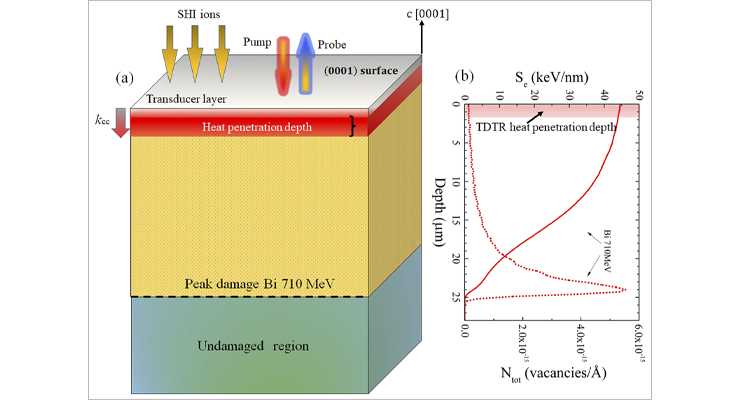Impact of swift heavy ion-induced point defects on nanoscale thermal transport in ZnO
News, 09 September 2024
Together with researchers from the scientific centres of Kazakhstan and South Africa, employees of the Laboratory of Nuclear Reactions at JINR studied the effect of point defects created by irradiation with swift heavy ions (SHI) on nanoscale thermal transport in ZnO. The results of the research were published in Materials Research Bulletin.
Using laser thermorefractometry, the team of specialists investigated changes in the near-surface thermal conductivity (k) of ZnO single crystallines. Zinc oxide samples were irradiated by 710 MeV Bi swift heavy ionsin the 1010 – 1013 ion/cm2 fluence range for the study of radiation damage caused both by single ion impacts and ion path overlapping regimes.
 (a) Schematic view of the SHI irradiated ZnO structure with deposited Al heat transducing layer for thermal measurement. (b) Ionisation energy loss (solid line) and vacancy production profile (dotted lines) in ZnO as a function of projected depth for 710 MeV Bi irradiation.
(a) Schematic view of the SHI irradiated ZnO structure with deposited Al heat transducing layer for thermal measurement. (b) Ionisation energy loss (solid line) and vacancy production profile (dotted lines) in ZnO as a function of projected depth for 710 MeV Bi irradiation.
Structural characterisation using X-ray diffraction, Raman spectroscopy, and transmission electron microscopy showed the absence of amorphisation after irradiation. The degradation in the k thermal conductivity was mainly explained by phonon scattering on point defects.
The results of measured k were used to validate the semi-analytical Klemens-Callaway model and a new hybrid approach based on the Monte-Carlo code TREKIS, which, coupled with molecular dynamics methods, provides a good description ofboth the effects of single ions and the repeated radiation exposure of ions during path overlapping. The findings lead to new approaches to developing functional materials using heavy ion irradiation.
The full text of the article is available via the link. Among the authors are employees of the Joint Institute for Nuclear Research, including researchers at the FLNR JINR Sector of Ion Implantation Nanotechnology and Radiation Material Science Ruslan Rymzhanov and Vladimir Skuratov.